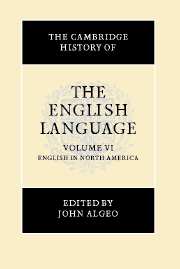Book contents
- Frontmatter
- 1 EXTERNAL HISTORY
- 2 BRITISH AND AMERICAN, CONTINUITY AND DIVERGENCE
- 3 BRITISH AND IRISH ANTECEDENTS
- 4 CONTACT WITH OTHER LANGUAGES
- 5 AMERICANISMS
- 6 SLANG
- 7 DIALECTS
- 8 AFRICAN-AMERICAN ENGLISH
- 9 GRAMMATICAL STRUCTURE
- 10 SPELLING
- 11 USAGE
- 12 CANADIAN ENGLISH
- 13 NEWFOUNDLAND ENGLISH
- 14 American English Abroad
- Glossary of Linguistic Terms
- Bibliography
- Index
- THE CAMBRIDGE HISTORY OF THE ENGLISH LANGUAGE
14 - American English Abroad
Published online by Cambridge University Press: 28 March 2008
- Frontmatter
- 1 EXTERNAL HISTORY
- 2 BRITISH AND AMERICAN, CONTINUITY AND DIVERGENCE
- 3 BRITISH AND IRISH ANTECEDENTS
- 4 CONTACT WITH OTHER LANGUAGES
- 5 AMERICANISMS
- 6 SLANG
- 7 DIALECTS
- 8 AFRICAN-AMERICAN ENGLISH
- 9 GRAMMATICAL STRUCTURE
- 10 SPELLING
- 11 USAGE
- 12 CANADIAN ENGLISH
- 13 NEWFOUNDLAND ENGLISH
- 14 American English Abroad
- Glossary of Linguistic Terms
- Bibliography
- Index
- THE CAMBRIDGE HISTORY OF THE ENGLISH LANGUAGE
Summary
Introduction
“You sockdologizing old man-trap” were the last words Abraham Lincoln heard before the assassin's bullet buried itself deep in his brain. Laughter at Ford's Theatre in Washington was suddenly interrupted by the gunshot. A line from a popular British comedy, Our American Cousin, these words produced hearty guffaws from the audience; sockdologizing was funny because it was an “American” word put in the mouth of an American type, the hearty backwoodsman, whose intrusion into the drawing room of an English country house established incongruity and created humor. Like many American expressions that became known abroad, it was fantastic, improper, and extravagant. As recreated for the London stage, it was also wrong.
The author of Our American Cousin was Tom Taylor (1817–80), a brilliant child of a brewing family in the north of England, a gold medalist as an undergraduate at the University of Glasgow, and subsequently a fellow of Trinity College, Cambridge, where he excelled in classics and mathematics. From 1845 to 1847, Taylor was Professor of English Literature and Professor of English Language at the University of London; he then qualified as a barrister and, not long after, accepted an appointment in the newly founded public health service. All the while he was a regular contributor to the daily newspapers and to the humor magazine Punch, eventually rising to the position of editor. By mid century, Taylor had become one of the most popular of English playwrights, adapting familiar tales like Cinderella and Whittington and His Cat for the London stage and recreating in dramatic form such novels as Stowe's Uncle Tom's Cabin and Dickens's Tale of Two Cities.
- Type
- Chapter
- Information
- The Cambridge History of the English Language , pp. 456 - 496Publisher: Cambridge University PressPrint publication year: 2001

